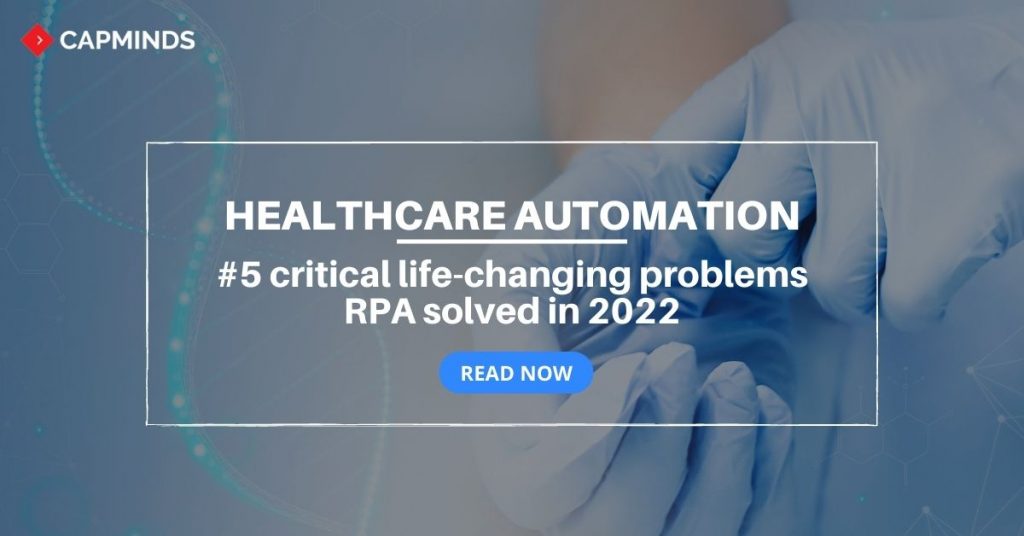Healthcare Automation: #5 critical life-changing problems RPA solved in 2025
Can we say that the healthcare spectrum is 100% on the verge of transformation toward automation?
We know that we are not yet there, but the path to completed healthcare automation is clearer with Robotic Process Automation (RPA). It is not like robots coming to the rescue like in movies. RPA is just software like others which is more affordable and practical than fiction.
RPA has addressed many of the problems arising in the past few years due to the pandemic. Committees were formed and decisions were made. Even though not at its fullest potential, RPA solved 5 critical problems that hand-tied the healthcare spectrum. It increased convenience, managing vital health information, productivity, efficiency, better decision-making, and more.
5 Healthcare real-time problems solved by RPA in 2022
IT systems are being soaked into the healthcare spectrum now. There are always some barricades slowing down the care management progress. These barricades come in the form of inaccurate data, claim denials, unorganized EHR workflows, and so on.
These things impact billing, prescribing, scheduling, patient onboarding, and treatments. Robotic Process Automation (RPA) can rescue providers from tiresome and repetitive tasks & processes. It empowers each individual associated with the spectrum.
RELATED: Major Healthcare Automation Trends: Directly answering your risk & profitability queries
1. Claims management
Problems:
- Manual tasks like patient data input, evaluation, and submission.
- Increases errors and results in denied claims.
- Impacts the facility’s financial workflow negatively.
Solutions:
- RPA replaces all the manual work with more speedy, reliable, accurate, and affordable processes.
- It reduces claim denials.
- Improves data quality and constancy to regulatory requirements.
2. Appointment scheduling
Problems:
- Managing booking & scheduling appointment processes manually.
- Decreases the concentration of providers on patients.
- Increase in no-show rates due to long waiting hours.
Solutions:
- RPA can automate and improve appointment booking & scheduling processes.
- It collects data from patients and uses them to schedule with an appropriate physician.
- It marks it on the calendar of the application and alerts through email in case of any changes.
RELATED: Digital Process Automation: Everything You Need To Know
3. Remote patient care
Problems:
- Remote Patient Monitoring (RPM) procures vitals using medical devices attached to patients and sends them to an EHR.
- It currently involves manual data entry and is an offline process.
- Providers need more time to reach patients.
Solutions:
- RPA can integrate with medical devices to track vital signs for alerting the provider.
- It reduces the time taken to reach patients by providers by sending real-time data.
- It helps healthcare providers to make faster diagnoses and decisions.
- It eliminates the manual interventions from the clinicians.
4. Instruction on discharge
Problems:
- After discharge patients will be provided with prescribed medications and follow-up instructions.
- Every patient doesn’t follow the regimens and providers can’t always ensure that the patients follow them.
- Alerting and notifying them periodically after discharge helps with this situation.
Solutions:
- RPA bots can be deployed to send post-discharge guidelines and follow-up alerts to patients.
- This reminds and makes the patients to visit their physicians regularly, and on time.
- The RPA bots can notify patients of scheduled tests and appointments.
- It can also help providers to keep a track of the progress of patients.
5. Insurance verification
Problems:
- Health insurance processes involve high-volume, back-office tasks like manual data extraction, integration of them with PMS and EHR, etc.
- These vital steps need utmost care and shouldn’t have room for mistakes.
- One error can put both the provider and the patients in a bad spot with legal complications.
Solutions:
- RPA efficiently tracks errors in workflow and adds extra care to the verification process.
- It automates the manual processes of eligibility information and increases collections.
- Then it gathers information and updates the patient profile on the PMS system.
RPA services from CapMinds
CapMinds’ Robotic Process Automation (RPA) Solutions empower you to make a digital workforce that works along with your staff to drive greater efficiency.
Our healthcare automation services can cut tasks like scheduling, managing inventory, billing, and claim processing. Our services will reduce operational costs and improve scalability. Our services will give you greater compliance, improves your productivity and efficiency, and more.
Increase your;
- Appointment turnout
- Automate monitoring of accounts payable/receivable
- Digitize patient records
- Improve patient experience, and
- Automate data transformation with CapMinds’ smart RPA solution.
“Reduce risk factors, increase efficiency and double your revenue with CapMinds innovative health automation services”




